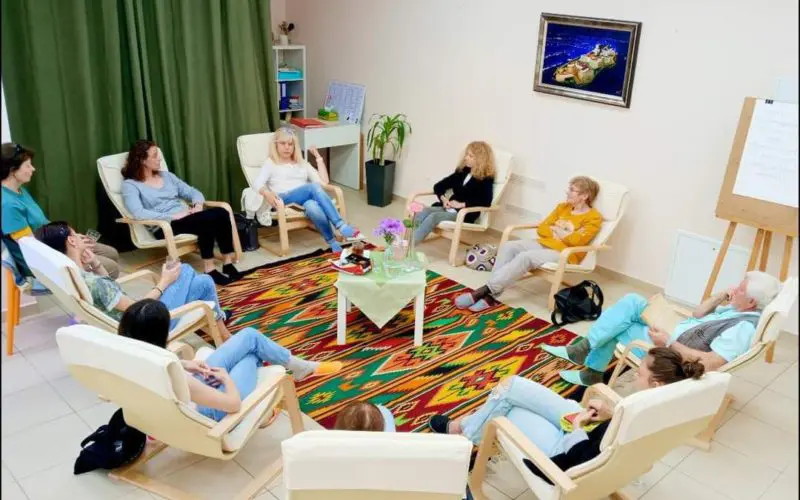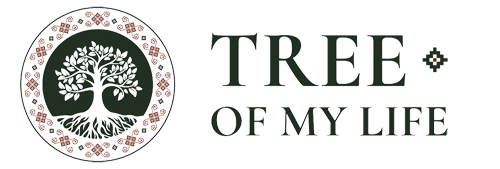Psychological support space in Zakarpattia helps IDPs, military, volunteers

Psychological rehabilitation of vulnerable groups
13.07.2023
“Sacred Art of Zakarpattia” – icon painting: a project of the “Tree of My Life” Charitable Foundation
12.08.2023
For the second year in a row, the psychological support space “Tree of My Life” has been operating in Zakarpattia. It is atmospheric, safe and cozy. Anyone who suffers from full-scale aggression has the opportunity to receive professional help, explore their emotional states, look for ways to increase internal resources, share thoughts and experiences. They also have the opportunity to be filled with useful knowledge and interesting activities. In total, 600 people have received psychological support here so far.
Liubov Mykhailiuk, the head and co-founder of the psychological resource educational and cultural project “Tree of My Life,” told us about how the space is organized and what interesting and useful things its visitors can learn.
– How long has the space been operating and in which cities has it managed to scale?
– The idea to create the Tree of My Life psychological support space arose with the beginning of the full-scale invasion. Sometimes stressful conditions give rise to new ideas.
In the first days after February 24, 2022, we were making decisions about what everyone in their place could do here and now. Since I was friends and cooperated with my colleague, psychotherapist Ksenia Tarnavska, we decided to provide psychological assistance to those who needed it. So, together with Ksenia, we became co-founders of the psychological space.
Based on the experience of 2014, we directed the first aid to volunteers who supported the army, working 24 hours a day. Later, we joined in to help displaced citizens. We consider March 1 to be the day we started. That was the first time we publicly announced that a support group for volunteers was being formed. The arrival of the next groups of IDPs in western Ukraine gave us an impetus to launch further active work. We immediately started working in three cities: Uzhgorod, Mukachevo and Svalyava. There were colleagues there with whom we made a joint decision to provide psychological assistance to those who suffer from full-scale aggression.
And so we have been working in three cities to this day, with the difference being that we add new support groups for volunteers, internally displaced persons, families of soldiers on the front line, those who have lost relatives, gone missing or are in captivity. We recently met with veterans who are undergoing treatment at the hospital.
We work for quality. Every person who stabilizes and receives a certain resource is ready to pass on their knowledge. After all, group sessions provide an opportunity to use the acquired skills in everyday life. Informally, we have provided support to about 3.5 thousand of our citizens in this way.
– Who is the author of the name “The Tree of My Life” and what is its significance?
– The idea of the name has been in my head for a long time, it stuck and germinated at the right time. Together with the co-founder of the project, Ksenia Tarnavska, we decided on this one – “The Tree of My Life”. There were no discussions. We capitalized all three words to affirm that here, today, and now, this story we are writing is happening.
Each person is individual in nature, has his or her own roots, and brings something of his or her own to this world. Our logo is an image of a tree framed in the style of Ukrainian embroidery. Why is it so fundamental? Every good tree that has survived must have good roots. And when it has good roots and a healthy trunk, it bears good fruit. In the context of this tree, we, the people, are the trunk.
When a person does not know where his or her roots are, has nothing to rely on, he or she is like a tumbleweed. A person who has his or her roots can clearly stand his or her ground, defend his or her boundaries, value, identity, human dignity, and understand what he or she wants. Remembering our roots helps us today to fight for our independence and wage a victorious war against the aggressor. It is up to us now to decide what we will give to this world, what we will leave to our children after our victory.
– At whose expense do you manage to create such cozy locations in the same style? Where did the idea for this particular interior design come from?
– The task that we set ourselves at the beginning of the invasion, when internally displaced citizens began to arrive in the west of the country, was to solve simple and elementary problems of psychological hygiene, security and trust. Every person is valuable to us. That is why we want people to feel as comfortable as at home.
The style of our facilities is in calm light colors for grounding, for relaxation, for rest. Hutsul carpets add to the warmth of home.
Of course, we need funding and are looking for it. The first support for this project came from friends from Europe, the local Roman Catholic Bishop of the Mukachevo Diocese, Mykola Luchko, and the Caritas charity organization from the Czech Republic. We also receive free donations from caring people and write grants. We are person-centered and look for funding for the challenges of the times, for what a certain category of people needs. We respond to this and develop.
– How do you involve psychologists in the project and on what terms do they work: with pay or on a volunteer basis?
– Today, 18 colleagues work with me in our team. The challenges of the times dictate their own. We realize that we need professional people. Each support group needs an internal resource: a psychologist, a counselor, a psychotherapist. They are trained for each group. It is quite psychologically exhausting work. But we need to increase the team, and we are working on it.
From the very beginning of our work, we decided that there should be a reward for work, so that people would be motivated. But still, most of our specialists are ideological people, not those who would like to earn huge amounts of money. After all, this remuneration is several times less than commercial payment. Since the first day of the invasion, our specialists have been taking additional training courses in certain areas, and not all of them are free of charge. However, we still call our work ideological volunteering.
– In addition to psychological support, you have started group meetings with the 50+ and 60+ community. Why did you choose this category of citizens?
– We started meetings in the 60+ group (people over 60 years old – ed.) in 2021. This group was one of the first. We saw that people of retirement age, especially Transcarpathians, were left alone: their children left to work, their grandchildren went to college. Everyone is social, they want to be needed. In addition, the lion’s share of the first resettled citizens were elderly people and mothers with children. Currently, the so-called integration of these categories of people into the community has taken place. They are creating their own volunteer initiatives, collecting herbs for the guys to make tea, jars for trench candles, canned food, drying vegetables for dry borscht, weaving camouflage nets, helping at a charity fair – volunteering at their own level.
The 50+ group was only at the level of a dance move. These are ladies who have not yet turned 60 and really wanted to dance. Nowadays, there are also those who are 40 years old. We no longer set any age limit here.
– You organize a lot of interesting and creative events: book gatherings, borscht parties, speech therapy for adults, right-hemisphere drawing, etc. What are these initiatives about?
– Borsch party. We cooked borsch for our veterans who are in a military hospital. We were invited to an informal meeting with the guys to talk to them. It was an initiative of volunteers from Zakarpattia. The most important thing in this cooperation is human relations and humanity. Sometimes you just have to be silent and be present.
Our colleague organizesthe book meetings. She is one of the members of the support group, the wife of a soldier. These meetings are aimed at cultural and educational work among the displaced. Thanks to the works of Ukrainian literature, our fellow citizens have the opportunity to better master the Ukrainian language. It is also about the achievements that we have, that we can rely on, that help us develop.
Speechtherapy for adults is conducted by our participant, now a colleague, a twice internally displaced person, a correctional teacher and a speech therapist. Speech therapy for adults helps to restore the speech apparatus, speech, soften facial muscles, which are compressed in constant stressful situations or physical injuries, and prevents dementia. The sessions are especially useful for those who have experienced microinfarctions or microstrokes.
Therapy sessions are held in partnership with the International Organization for Migration. Intuitive drawing is conducted for social workers, teachers, and people of auxiliary professions in local communities. Body-oriented art therapy support groups operate on a regular basis. After all, right-hemispheric drawing is not about drawing as such. It is also a great and deep work on oneself through drawing.
The cultural and educational event “Sacred Transcarpathia ” is connected with the introduction to icon painting, which differs from the generally accepted Ukrainian iconography. When a person learns about his or her own culture, his or her own roots, he or she is transformed. Then he/she has an understanding of what he/she can give.
During the classes, we have a kind of integration, when the group members themselves want to introduce other areas and types of help and support.
– Are there any plans to develop and scale up the psychological support space?
– We have plans to scale up. We would like to open similar spaces in the district centers of Zakarpattia. We understand that in the near future, both rehabilitation and habilitation (a system of measures and social services aimed at helping a person acquire the knowledge and skills necessary for independent living in the social environment – author) will be needed for veterans, their families, communities and society. It will not be the same as it was. We will have to get used to the military, and the military will have to get used to civilians. This is a completely different interaction. We will try to respond to the challenges here and now. In the future, we also intend to open rehabilitation and habilitation centers. I really believe that this business will move and develop gradually. Everything happens in its own time.
Author: Anna Shvets
Source : social.com.ua
